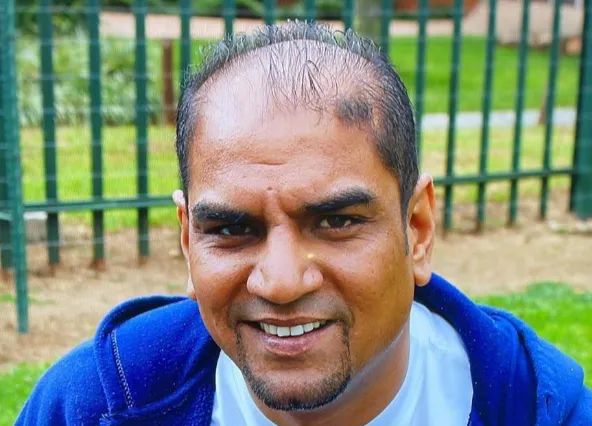
Mahendran Naicker.
Image: Supplied
ALMOST six months ago, Mahendran Naicker received a kidney transplant which he said had given him a second chance at life after he suffered renal failure.
The 48-year old, of Morningside, was diagnosed with IgA nephropathy, or commonly known as Berger's disease, nine years ago.
It is a kidney disease in which IgA antibodies build up abnormally. Over time, it leads to kidney damage or kidney failure.
Naicker, an IT support analyst, said prior to his diagnosis he sought treatment after suffering from a constant headache.
At the time he was 39-years-old and working in Johannesburg.
“I was taking over-the-counter medication for pain, but the headache would not subside, so I decided to see a general practitioner. He told me my blood pressure was high and gave me medication.
“However, it became worse. About four days later, I went to a general practitioner, who I usually visited. He conducted various tests, including a kidney function test. He informed me that my kidney was deteriorating and was functioning at only 58%. The doctor advised me to see a specialist. At first I was scared and disappointed that I ended up with this issue in my life,” he said.
Naicker said he thereafter visited a nephrologist.
“He did a biopsy and informed me that my kidney had deteriorated due to high blood pressure and that I had Berger's disease. I was also in stage 3 renal failure. He advised me to try to keep my blood pressure down, do some exercise and watch what I ate.
“Through my experience and doing research, I found that eating processed foods and proteins such as red meat puts more pressure on the kidneys. I started eating more vegetables and drinking more water.
“However, I decided to get a second opinion and visited another nephrologist. He told me at the rate my kidney was functioning, one day I would be sitting on a dialysis chair. Not knowing what was to come, I decided to move back to Durban as I was living alone at the time and wanted to be around my family. Thankfully, the company I worked for was able to give me a transfer to their offices in Durban,” he said.
Naicker said his health had deteriorated.
“I remember I had attended a family braai one Saturday evening. I watched what I ate, but during the early hours of Sunday morning I suddenly woke up feeling violently ill. I was nauseous and struggled to breathe. I initially thought it was signs of a stomach flu (gastroenteritis), but over the next few days it became worse. I was nauseous and felt tired and I could barely keep my eyes open. I did not know that those were the symptoms of renal failure.
“I went to see a nephrologist at a hospital in Durban. After he did some tests, he told me that I was at the end stage of renal failure, and had to be admitted immediately. At that time, I felt as if there was a knot in my chest, which was actually fluid that was building up. I was sent into the theater for a catheter to be placed in my chest. Everything changed after that. About three days later, I started dialysis,” he said.
Naicker said he was thereafter put on a waiting list for a transplant.
“I was told I would need a transplant. I asked family members but they were reluctant and sceptical about being a donor. I guess it was due to fear and a lack of knowledge. During this time I continued with dialysis, and tried to maintain a healthy lifestyle. But it was definitely difficult as my future was so uncertain.”
He said he received a call about his transplant in February this year.
“It was a normal day and I had just got out of a meeting at work. I am an avid cyclist, and was making plans to meet with friends to go cycling, when I received a call from an unknown number. The lady said ‘you need to come to the hospital to do some blood tests’.
“It did not register at that moment and because I was making plans with my friends, I said I was currently busy and would go in the next day. She then told me she was from the transplant department and that they had a donor. She said I needed to go in now to do blood tests and then for the transplant. In that moment, I experienced an array of emotions, from anxiety and fear to joy that I was getting a second chance at life.
“I rushed home to pack some clothes and then went to the hospital. Soon after the blood tests were done, I was taken into the theater for the transplant, which took about four hours. It took me about a month to be fully recovered with odd pains but nothing serious.
“I am grateful for the doctors and transplant team who were there to support me throughout my journey. I am also thankful for the support from my family and friends. I also kept telling myself I have been through a lot and this will work. My mantra is ‘it will be okay’,” he said.
Naicker said it was important for people to take care of their health.
“Sometimes when we are too busy with work and life in general, we tend to forget about our well-being. But through my experience I have seen how important it is to make sure you do regular check-ups, as sometimes you can be ill and not know because there are no present symptoms.
“In addition, if you are in a position to become a donor, you should look into it as you can be that person to give another a second chance at life,” he said.
Related Topics: